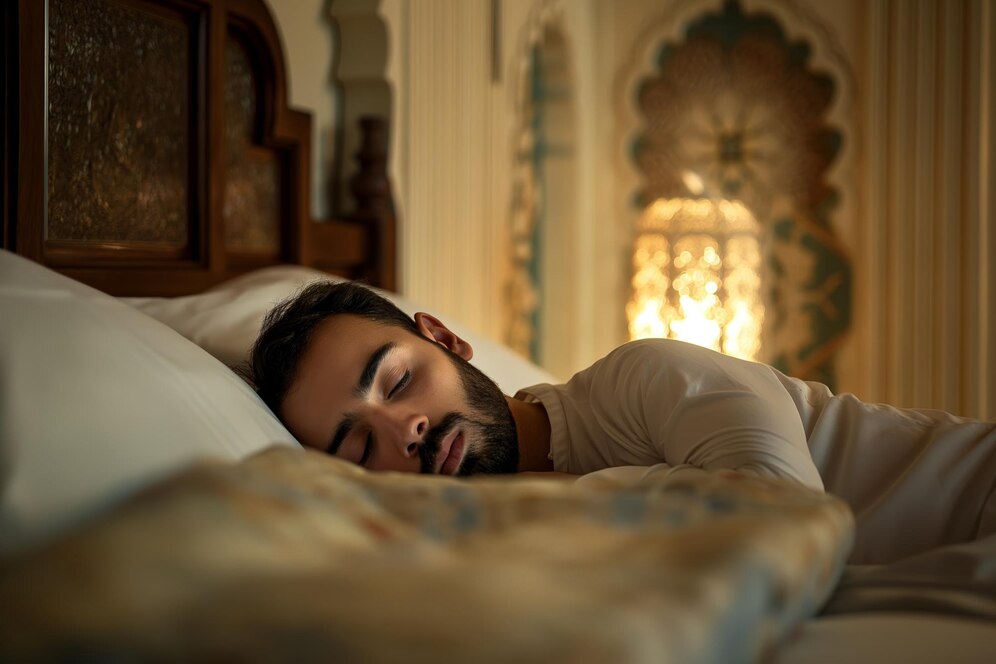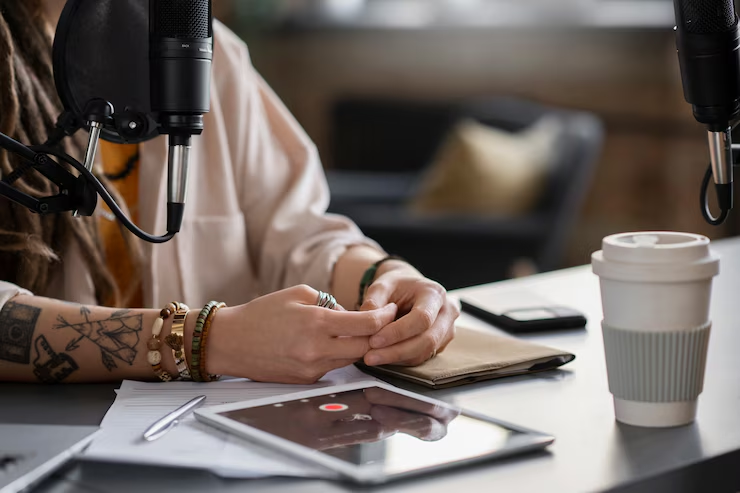Contents
- 1 How to Naturally Sleep Better at Night: Easy Ways to Get Deep, Restful Sleep
- 2 A Warm, Dim Room Can Make a Big Difference
- 3 Don’t Scroll—Use Guided Sounds or Breathing Instead
- 4 Eat Light, Sleep Right: A Diet to Help You Sleep Better
- 5 Your Bed Should Work for You
- 6 Stick to a Bedtime Routine, Even if It’s Only 10 Minutes Long
- 7 Quick Tips: How to Fall Asleep in 5 Minutes
- 8 How to Get More Deep Sleep Naturally
- 9 FAQs
- 9.1 1. How to naturally get better sleep at night?
- 9.2 2. How to fall asleep in 5 minutes?
- 9.3 3. How to get more deep sleep naturally?
- 9.4 4. How to stay asleep all night without waking up?
- 9.5 5. How can you get better sleep?
- 9.6 6. How to sleep well and wake up feeling good?
- 9.7 7. What diet is best for getting better sleep?
- 9.8 8. What to do when you can’t sleep?
- 9.9 Before I End..
- 9.10 Related Articles
How to Naturally Sleep Better at Night: Easy Ways to Get Deep, Restful Sleep
Your body is tired, but your mind is racing. You move around a lot. You look at your phone, hoping it will help you fall asleep, but it just makes things worse. You’re not the only one who feels this way. It’s not just the number of hours you sleep that matters; it’s also how restful those hours are.
The good news is? You don’t always need pills or complicated rituals to sleep better. There are a few easy things you can do tonight to start improving your sleep quality naturally. This guide has everything you need to know about how to sleep quickly in 5 minutes, how to get more deep sleep naturally, or how to sleep all night without waking up.
A Warm, Dim Room Can Make a Big Difference
Your bedroom should feel like a place where stress can’t get to you. Your brain stays awake even when your body is tired if there are bright lights or a lot of stuff around you at night.
About 30 minutes before bed, turn down the lights. This will tell your body that it’s time to relax. Soft lamps, salt lamps, or even candles can help set the mood for sleep. This is an important step if you want to sleep better at night naturally.
Websites like The June Shop and Wakefit have calming lights and simple bedroom decor that help you sleep better without overstimulating your senses.
Don’t Scroll—Use Guided Sounds or Breathing Instead
Your screen might be to blame if you often wonder how to sleep when you can’t. Your brain thinks it needs to stay awake when you keep scrolling. Instead, listen to guided audio to help you relax.
Apps like Headspace and Calm have bedtime stories, calming music, and breathing exercises that can help you fall asleep quickly, sometimes in just a few minutes. You could even check out YouTube channels with “deep sleep frequencies” that help calm your nervous system.
If you’re looking for something nearby, Gaana and JioSaavn have made “Sleep Playlists” that can help you sleep through the night without waking up.
Eat Light, Sleep Right: A Diet to Help You Sleep Better
The last meal of the day has a big effect on how well you sleep. A big, spicy dinner close to bedtime can make you feel bloated, uncomfortable, or sick. That’s why you’ve had trouble falling asleep after a late-night meal.
Foods high in magnesium, like bananas, almonds, spinach, and whole grains, are part of a “diet for better sleep” because they relax your muscles. Also, don’t drink coffee or eat sugar before bed because they give you a lot of energy.
Try herbal teas from Tata Tea Wellness or Organic India if you like to drink something before bed. Chamomile, lavender, and tulsi teas are all good for relaxing the mind and helping you sleep better.
Your Bed Should Work for You
Your mattress and pillow have a big effect on how well you sleep. You might need to change how your bed is set up if you wake up tired, stiff, or sore.
Memory foam pillows, orthopedic mattresses, and sheets that let air flow through them can make a huge difference in how well you sleep and how rested you feel the next morning.
Platforms like Sleepyhead and Duroflex have bedding that is comfortable and good for your body, so you can get deep, uninterrupted sleep. A mattress that supports you not only helps you fall asleep faster, but it also helps you get better deep sleep cycles.
Stick to a Bedtime Routine, Even if It’s Only 10 Minutes Long
The key to getting a good night’s sleep and waking up feeling refreshed is to be consistent. Your body loves a good beat. Going to bed and waking up at the same time every day helps keep your body’s clock in sync.
If you don’t have time for a full hour of nighttime ritual, at least give yourself 10 minutes of peace. You could wash your face, do some light stretching, or read a few pages of a book.
You can also keep a “sleep journal” to see patterns in what helps or hurts your sleep. The Ink Bucket or Zoop Planners are great for keeping track of your bedtime habits and figuring out what really helps you sleep better.
Quick Tips: How to Fall Asleep in 5 Minutes
If you have trouble falling asleep, try these quick tips that will help you fall asleep fast in under 5 minutes:
- 4-7-8 Breathing: Breathe in for 4 seconds, hold your breath for 7 seconds, and then breathe out for 8 seconds. It quickly calms down the nervous system.
- Relax Your Muscles: Begin with your toes and consciously relax every part of your body.
- Visualization: Picture a calm place, like a beach or a mountain trail. This will help you stop overthinking.
- Don’t Look at the Clock: Turn it away. Watching the clock only makes things worse.
You can sleep quickly and naturally without taking medication or supplements if you make these small changes.
How to Get More Deep Sleep Naturally
During deep sleep, your body heals, fixes things, and stores memories. To make this important stage of rest better:
- Keep a consistent bedtime—try to go to bed and wake up at the same time every day.
- Make sure your room is dark and cool. Melatonin, a hormone that helps you sleep better, rises in the dark.
- Cut back on caffeine and alcohol at night.
- Do your workouts at least three hours before bed, but make sure to do them regularly.
You can naturally increase deep sleep and wake up feeling completely refreshed by following these habits.
Don’t miss: Perfect Evening Ritual for Restorative Sleep and Energetic Mornings
FAQs
1. How to naturally get better sleep at night?
You can naturally improve the quality of your sleep by making your bedroom calm, staying away from screens, and sticking to a regular sleep schedule.
2. How to fall asleep in 5 minutes?
Use visualization, relaxation exercises, or slow breathing to quickly calm your mind and body.
3. How to get more deep sleep naturally?
Keep your room cool, avoid caffeine late in the day, and practice mindfulness. Also, stick to regular sleep hours.
4. How to stay asleep all night without waking up?
Don’t drink alcohol or eat big meals before bed. Keep your room dark, and deal with stress at night by writing in a journal or meditating.
5. How can you get better sleep?
Limit the time you spend on screens, sleep on comfortable bedding, and eat foods that help you sleep, like nuts, bananas, and warm herbal teas.
6. How to sleep well and wake up feeling good?
Every night, go to bed at the same time, sleep in a cool, clean room, and give yourself time to relax before bed.
7. What diet is best for getting better sleep?
Eating foods high in magnesium, tryptophan, and complex carbs, such as almonds, oats, and leafy greens, can help you relax and get a good night’s sleep.
8. What to do when you can’t sleep?
Put your phone down, take a deep breath, or listen to relaxing music. Sometimes getting out of bed for a short time and doing something relaxing, like reading, can help clear your mind.
Before I End..
One of the easiest and most effective ways to improve your health, focus, and mood is to get a good night’s sleep. The key to getting better sleep, sleeping faster, or getting more deep sleep is to make sure you have consistent, mindful habits.
Tonight, start small: turn down the lights, drink herbal tea, and let your body do what it does best: rest deeply.





